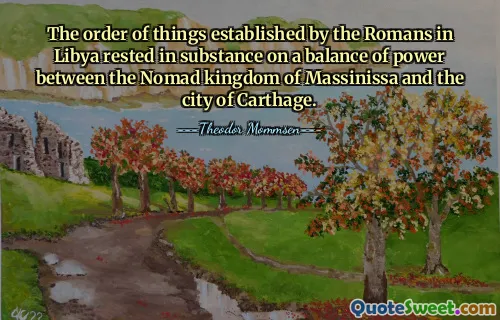Theodor Mommsen was a prominent German historian, known for his extensive work on ancient Rome. His most influential publication, "A History of Rome," offered a comprehensive analysis of Roman civilization, emphasizing its political, social, and military aspects. Mommsen’s writing was notable for its clarity and depth, which made complex historical narratives accessible to a broad audience. His scholarship laid the foundation for modern studies of Roman history, and his contributions remain significant in the fields of history and archaeology. In addition to his historical writings, Mommsen was also a prolific editor and commentator. He was involved in the publication of various historical texts and contributed to the advancement of historical methodology. His scholarly endeavors earned him the Nobel Prize in Literature in 1902, recognizing his impactful contributions to the understanding of history through a literary lens. Moreover, Mommsen's life was marked by his engagement in political affairs, particularly in the German Empire. He was vocal about his views on nationalism and was involved in various cultural institutions in Germany. His commitment to the integration of academic life with the public sphere reflected his belief in the importance of history to contemporary society.
Theodor Mommsen was a renowned German historian, best known for his seminal work on ancient Rome, "A History of Rome."
Mommsen's writings were characterized by their clarity and depth, making complex historical subjects accessible to a wide audience. He made significant contributions to modern historical methodology and scholarship.
Apart from his historical achievements, Mommsen was also politically active, engaging in issues relevant to German nationalism and culture, which highlighted his belief in the relevance of history to society.
Mehr anzeigen »
Today Birthdays
1955 -
Max Lucado
1946 -
John Piper
1842 -
William James
1907 -
Abraham Joshua Heschel
1887 -
Aldo Leopold
1755 -
Alexander Hamilton
1976 -
Alethea Kontis
1971 -
Mary J. Blige
1825 -
Bayard Taylor
1943 -
Jim Hightower
1885 -
Alice Paul
1923 -
Carroll Shelby
1928 -
David L. Wolper
1954 -
Kailash Satyarthi
1972 -
Amanda Peet
1946 -
Naomi Judd
1970 -
Malcolm D. Lee
1955 -
Christian Marclay
1973 -
Rahul Dravid
1987 -
Jamie Vardy
1942 -
Clarence Clemons
1992 -
Fatima Sana Shaikh
1948 -
Larry Harvey
1930 -
Rod Taylor
